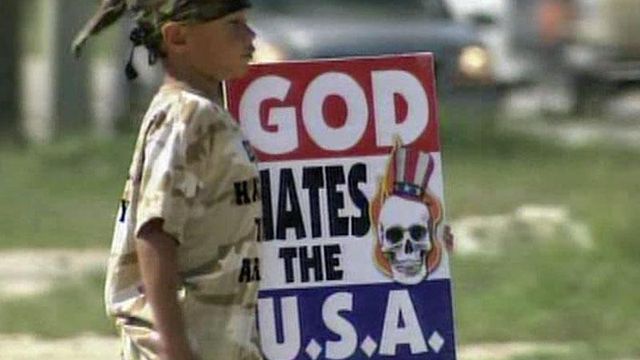US court rules for military funeral protesters
The Supreme Court ruled Wednesday that the free speech provisions of the U.S. Constitution protect fundamentalist church members who mount anti-gay protests outside military funerals, despite the pain they cause grieving families.
Posted — UpdatedThe court voted 8-1 in favor of the Westboro Baptist Church. The decision upheld an appeals court ruling that threw out a $5 million judgment to the father of a dead Marine who sued church members after they picketed his son's funeral.
Chief Justice John Roberts wrote the opinion for the court. Justice Samuel Alito dissented.
Roberts said the Constitution's First Amendment shields the funeral protesters, noting that they obeyed police directions and were 1,000 feet (300 meters) from the church.
"Speech is powerful. It can stir people to action, move them to tears of both joy and sorrow, and — as it did here — inflict great pain. On the facts before us, we cannot react to that pain by punishing the speaker," Roberts said. "As a nation we have chosen a different course — to protect even hurtful speech on public issues to ensure that we do not stifle public debate."
Alito strongly disagreed. "Our profound national commitment to free and open debate is not a license for the vicious verbal assault that occurred in this case," he said.
Matthew Snyder died in Iraq in 2006 and his body was returned to the United States for burial. Members of the Westboro Baptist Church, who have picketed military funerals for several years, decided to protest outside the church where his funeral was to be held.
The Rev. Fred Phelps and his family members who make up most of the Westboro Baptist Church have picketed many military funerals in their quest to draw attention to their incendiary view that U.S. deaths in Afghanistan and Iraq are God's punishment for the nation's tolerance of homosexuality.
In North Carolina, Westboro church members picketed on Fort Bragg in 2008 after the murders of Army soldiers Megan Touma and Holly Wimunc. They also came to the Army base in Cumberland County in 2007, a particularly deadly combat year for Fort Bragg.
Brandishing signs reading, "Thank God for dead soldiers," ''You're Going to Hell," ''God Hates the USA/Thank God for 9/11," church members typically draw counter-demonstrators, as well as media coverage and a police presence to maintain order.
Fort Bragg soldier Capt. Daniel Whitten was killed in Afghanistan last year. His wife, Starr Whitten, called the Westboro protesters "awful," "disrespectful" and "disgraceful," but said their right to protest is one of the American freedoms her husband died to protect.
"Part of being an American is being proud to support and uphold the Constitution," Whitten said.
The Westboro church did not appear at her husband's funeral.
Wednesday's Supreme Court decision came after Snyder's father Albert filed a lawsuit accusing the Phelpses of intentionally inflicting emotional distress. He won $11 million at trial, later reduced by a judge to $5 million.
A federal appeals court threw out the verdict and said the Constitution shielded the church members from liability.
Forty-eight states, 42 U.S. senators and veterans groups sided with Snyder, asking the court to shield funerals from the Phelps family's "psychological terrorism."
While distancing themselves from the church's message, media organizations, including The Associated Press, urged the court to side with the Phelps family because of concerns that a victory for Snyder could erode speech rights.
Roberts described the court's holding as narrow, and in a separate opinion, Justice Stephen Breyer suggested in other circumstances, governments would not be "powerless to provide private individuals with necessary protection."
But in this case, Breyer said, it would be wrong to "punish Westboro for seeking to communicate its views on matters of public concern."
• Credits
Copyright 2024 by WRAL.com and the Associated Press. All rights reserved. This material may not be published, broadcast, rewritten or redistributed.





